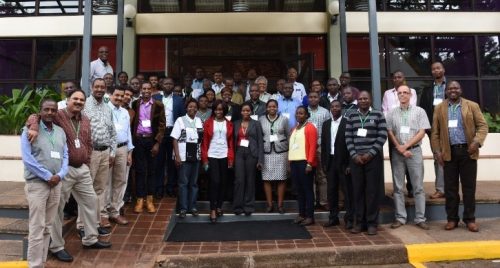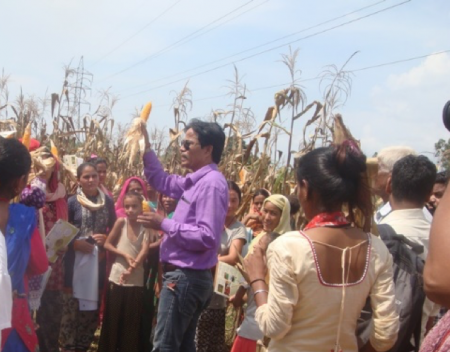
NAIROBI, Kenya (CIMMYT)- Representatives from across the maize production and breeding sectors in eastern and southern Africa gathered to discuss how maize seed systems in Africa can be strengthened through quality assurance (QA) and quality control (QC) measures.
The workshop conducted by the International Maize and Wheat Improvement Center (CIMMYT) in Nairobi, Kenya, from May 17 to 19, 2017, explored CIMMYT’s efforts to strengthen maize seed systems in Africa, with an emphasis on critical QA and QC basics such as maintaining parental inbred lines, maintaining seed free from pathogens, pests and implementing molecular marker based seed testing to achieve the highest seed quality at minimal cost.
QA and control are processes used to measure the quality of products, ensuring they meet consumer expectations. High quality seeds are genetically and physically pure, properly mature, free from insect-pests and pathogens, uniform in size, have high germination potential, optimum moisture content, viable and vigorous.
QA and QC also helps establish trait based purity, particularly in nutrient-enriched maize varieties such as quality protein maize and Provitamin A-enriched maize. Trait based purity ensures that the product delivered by breeders to seed companies and the product delivered by seed companies to farmers contain the required nutritional quality.
“The concept and effect of seed quality is a simple, yet hugely impactful one that cannot be ignored,” said Mosisa Worku, seed systems specialist at CIMMYT. “Production and supply of poor quality products means businesses collapse and farmer productivity plummets, often leading to food insecurity and compromised livelihoods when food shortages occur.”
B.M. Prasanna, director of CIMMYT’s Global Maize Program, stressed the need to adopt more modern and cost effective methods of analyzing the genetic purity and identity of breeders’ material. Thousands of inbred lines are available to maize breeders at any given time, so effectively distinguishing them on the basis of phenotypes alone is impossible.
“While the importance of phenotypic analysis in QA and QC cannot be undervalued, molecular markers which are robust and environmentally insensitive are more effective in determining genetic purity and identity of parental inbred lines and hybrid seed lots at a relatively low cost,” Prasanna said, explaining that the cost of genotyping is now significantly lower than growing and evaluating a row of sample seed in the field.
The workshop was designed for scientific and technical personnel involved in maize breeding, seed production and seed certification from both public and private sector institutes in eastern and southern Africa. A total of 38 participants learned about theoretical and practical sessions covering topics such as the importance of QA and QC for maize seed value chains, advanced QA and QC tools in maize breeding and commercial seed production, QA and QC of nutritional quality traits in seed and grain, molecular data analyses and interpretation for QA and QC and MLN-free commercial seed production.
The training program also included a field visit to maize research station at Kiboko, and the maize doubled-haploid facility at the Kenya Agricultural and Livestock Research Organization to evaluate maize inbred lines and hybrids planted for genetic purity demonstrations. Participants also visited the maize lab at the Biosciences eastern and central Africa – International Livestock Research Institute Hub to gain practical experience on the application of molecular markers, data analyses and interpretation of results.
Capacity building efforts like the workshop help ensure national seed certification agencies and that seed companies have the necessary skills to conduct molecular marker-based seed testing and phenotypic based methods for QA and QC in commercial maize seed value chains to build Africa’s seed systems.
 Capacity development
Capacity development 

